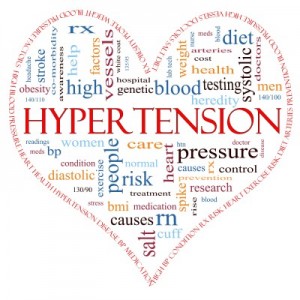I am 49 and suffering with slightly elevated blood pressure I exercise daily I eat very little meat mostly chicken and seafood. My blood pressure today was 150/100. I don’t feel bad, but it’s been high like this for a while. What can I do? — Signed GWL
Hello GWL! Thanks for your inquiry through my webpage!
I pulled together a little bit of basic information that you may find helpful to discuss with your primary care physician. The numbers you have given do represent hypertension if you have had several consistent readings like that. As you continue to check your blood pressure, be sure to check it at the same time every day – preferably at a time when you are most relaxed.
First Let’s Look at the Cause
I tend to refer to Hypertension a multi-factorial condition because there can be many contributing factors and in some cases, doctors may not be able to identify one specific cause for your hypertension. I’m providing you this first list to scale it and determine if you might have any of these potential causes active in your life. These are important to discuss with your primary care physician. Remember there are things that we can control but other things we cannot control – be diligent in maintaining your awareness of the difference between the two.
Potential contributing factors to hypertension include but are not limited to:
- Age – As we age our blood pressure increases because the arterial walls lose their elasticity.
- Stress – By activating the sympathetic nervous system, stress can cause the arteries to maintain a more rigid tone.
- Excessive salt – The sodium in salt can cause excess water retention, expands blood volume and ultimately increases blood pressure.
- Dietary Mineral Deficiency – A diet low in calcium, magnesium and potassium.
- Insulin resistance – This condition can increase blood pressure by various mechanisms including increased systemic inflammation and sodium retention as a result of kidney damage.
- Excessive alcohol intake – Defined as drinking in excess of two drinks daily for men under age 65, or in excess of one drink daily for women or men over age 65.
- Being obese or significantly overweight.
- Medications – Some prescription drugs, including steroids, birth control pills, decongestants, NSAIDS and diet pills can raise blood pressure. Some over-the-counter medicines, such as those containing licorice root, ephedra, guarana, kola nut, yerba mate, ginseng and yohimbe, may also raise blood pressure. Review your list of teas and over the counter medications you take with your primary care physician.
Scale THIS LIST to look for things you CAN control
- Limit caffeine intake.
- Limit alcohol intake.
- Avoid processed foods. These are the biggest sources of sodium in today’s diet.
- Maintain optimal weight.
- Relax. Meditation, yoga, breathing exercises and biofeedback can help lower blood pressure.
- Don’t smoke.
- Exercise. Try to get in 30 minutes of moderate exercise a day, such as walking.
- Check your medicines. Discuss your current medications and their risks of increasing blood pressure with your primary care physician. You will also need to speak with your primary care physician about pharmaceutical medications that might need to be prescribed to help control your blood pressure.
Ok, so you have done those things already? Don’t throw in the towel yet!
Here are just a few more natural interventions to consider.
- Eat 8 – 10 servings of vegetables and fruit per day.
- Limit your intake of meat.
- Limit salt intake. If you are salt sensitive or have a family history or hypertension, reducing salt to about one teaspoon a day may help control your blood pressure.
- Use garlic. Cook with it, eat it. While some may argue that there is “no evidence” that garlic lowers blood pressure, there is some evidence that suggests it is useful. Let me digress to this thing about “the evidence” … I’m starting to comprehend a problem with the demand “the evidence” requires to eliminate all variables and reduce the affects observed in a study to just one thing and apply that to a very broadly diverse population… I appreciate how totally unrealistic that is when you are dealing with human beings. The bottom line is this – I consider garlic (and some of the other recommendations in this post) to be in the category of things you can do that have no life threatening side effects like some of the pharmaceutical drugs that are used to control blood pressure. So even if garlic doesn’t lower your blood pressure – it won’t harm you and there is some evidence that says it helps! Can’t say that for the pharmaceuticals.
- Consume four to five servings of nuts, seeds and dry beans per week.
- Eat plenty of fish rich in omega-3 fatty acids. Talk with you primary care physician about taking fish-oil supplements if you cannot get enough omega-3-rich foods.
- Take calcium and magnesium. Inadequate intake of both of these minerals has been associated with high blood pressure.
- Take vitamin C. This antioxidant vitamin has been shown to lower blood pressure in people with mild to moderate hypertension. Again, some may argue that “the evidence” is weak, but the harm from adding vitamin C to your diet is negligible.
I hope I’ve given you some useful things to discuss with your primary care doctor.
Peace, love, light, wisdom, abundance, joy, balance, harmony, & health to you!
Dr. Pamela Ross, MD

